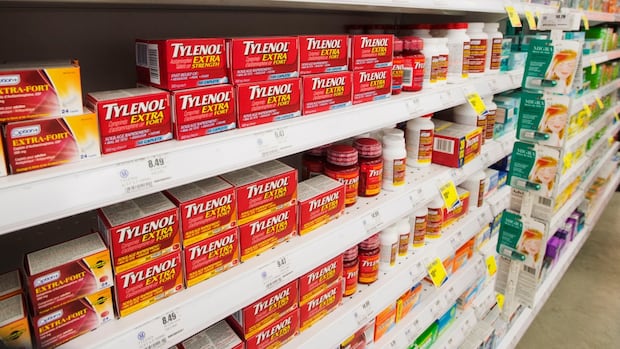WorldAfter U.S. President Donald Trump linked Tylenol use during pregnancy to autism spectrum disorder, several health organizations refuted his claims. But the painkiller’s parent company still has to do damage control.Despite lack of clear evidence for autism claims, Tylenol parent firm still must do damage controlAnya Zoledziowski · CBC News · Posted: Sep 24, 2025 4:00 AM EDT | Last Updated: 11 hours agoA spokesperson for Tylenol’s parent company says it believes ‘independent, sound science clearly shows that taking acetaminophen does not cause autism.’ (Ryan Remiorz/The Canadian Press)Damage control is well underway as Tylenol’s parent company races to dispel U.S. President Donald Trump’s unsubstantiated claim that Tylenol use during pregnancy is linked to autism spectrum disorder. “Don’t take it. Fight like hell not to take it,” Trump said on Monday, linking the painkiller’s active ingredient, acetaminophen, to the condition.There isn’t conclusive evidence backing up the association, experts warn. Kenvue, which makes Tylenol, has said much the same.WATCH | Trump comments draw immediate medical professional pushback:Trump makes unproven link between autism, acetaminophenThere was immediate pushback from medical experts and a major drug manufacturer after U.S. President Donald Trump said without evidence that pregnant women shouldn’t take acetaminophen because it can cause autism.”We believe independent, sound science clearly shows that taking acetaminophen does not cause autism,” a spokesperson said in a statement to CBC News. “We strongly disagree with any suggestion otherwise and are deeply concerned about the health risks and confusion this poses for expecting mothers and parents.”Still, Kenvue must now find its way out of a major public relations crisis, experts told CBC News. “The burden of proof is on the company to reintroduce their safety measures,” said Carol Levine, CEO and co-founder of Energi PR. Managing a crisisThe Tylenol fallout could last a long time, said Julie McCarthy, co-founder and president of Toronto-based public relations firm BlueSky Communications.”Keeping an eye on the conversation and trying to contend with misinformation, while balancing it with accurate information … that’s a hard task,” she said, adding that the company will likely have to monitor how this situation plays out for quite a while, especially on social media.Still, she said, the brand benefits from being a decades-old household name. Plus, the support Tylenol is getting from credible organizations and experts goes a long way, she added.”In any crisis, and particularly this one, speed makes a huge difference,” McCarthy said, adding Kenvue’s statement came quickly and included scientific information, as well as “language that people can resonate with.” The concern is that medical misinformation is getting worse — and health-care and pharmaceutical companies already struggle to maintain the public’s trust, Levine of Energi PR said. “I don’t see this as a one-off,” she said. “Today, it’s Tylenol; tomorrow it’ll be something else. It’s vaccines. Then another medication. Who knows where it will end.”For that reason, she says, Kenvue and its competitors should work together on PR campaigns that educate the public. “There is an opportunity here for competitors to huddle under the same tent,” she said. “Together they represent a stronger voice.” The Tylenol brand benefits from being a decades-old household name, says the president of public relations firm Blue Sky Communications. (Adrian Wyld/The Canadian Press)Companies could also collaborate with patient organizations, she said, like those specializing in autism, creating information campaigns using stories from people with lived experience. “This would be a great time to reinvigorate scientific communications with webinars and videos and really get to the audiences most affected by this.”‘A make-work project’Trump’s comments could lead to more than just a PR crisis, as health-care providers are stuck managing the fallout with patients.Several experts told CBC News they’re indeed worried that people who have taken Tylenol while pregnant may feel guilty or confused following Trump’s comments. They warned it may also inspire patients to instead opt for medications that aren’t as safe. For example, Advil, or ibuprofen, is already not recommended after 20 weeks of pregnancy, due to potential serious complications.”It was a really disappointing comment to hear as a health-care provider,” said Dr. Darine El-Chaar, a spokesperson for the Society of Obstetricians and Gynaecologists of Canada (SOGC). Many organizations around the world — including the SOGC, the European Medical Association and the World Health Organization — have restated existing medical guidance and reiterated that there isn’t strong scientific evidence supporting Trump’s claims. Even the U.S. Food and Drug Administration has admitted that “a causal relationship has not been established” between acetaminophen and neurological conditions, despite announcing its intention to put safety labels on Tylenol packaging.WATCH | A look at medical studies the Trump administration used:I tried to understand Trump’s argument that Tylenol causes autism | About ThatU.S. President Donald Trump has clear guidance for women using Tylenol while pregnant: don’t do it. Andrew Chang examines studies the Trump administration used to draw a link between acetaminophen and autism to break down the argument for the guidance — and why medical experts largely disagree. Images provided by Getty Images, The Canadian Press and Reuters.For now, patients are left managing conflicting information. El-Chaar says her own patients have since asked whether Tylenol is safe, and that the comments have the potential to stigmatize autistic people.She added that this situation forces health-care professionals away from the work they’re meant to be focusing on. “This is a make-work project,” El-Chaar said. “Our efforts should be put towards finding therapies and breakthroughs instead of correcting misinformation.”ABOUT THE AUTHORAnya Zoledziowski is a Peabody-winning multimedia journalist from Edmonton who’s covered social and climate justice, Indigenous affairs, gender, politics and more, and has been recognized by several national and international awards. She’s currently pursuing her PhD in journalism studies.
Trump’s autism announcement leaves Tylenol’s parent company with PR crisis











